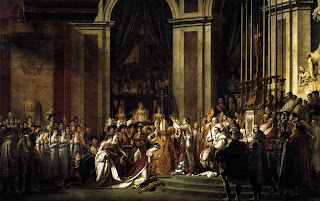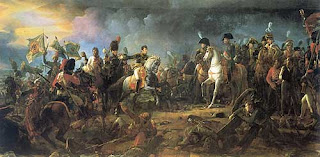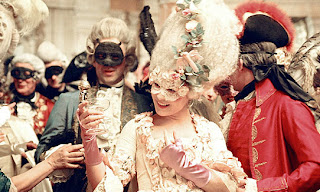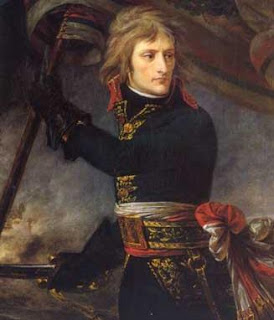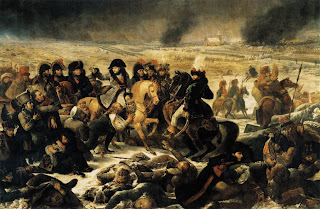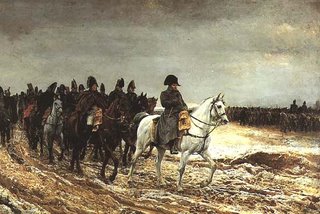I loved this line: "We come in through the window to find Lisa and Jeff smooching, but he can't keep his mind on her (WHAT?!?!?! This is Grace Kelly)." Hey, if that was me dating Grace Kelly, let me tell you, Jack the Ripper could've wiped out the neighborhood and I would've never noticed. Hehehe...
(For those of you who may be new to my blog, this article is part of Miriam Paschal's sensational series of movie breakdowns. She's studying the world's most renowned filmmakers.)
As always, just a beautiful job, Miriam.
-MM
1. 1:06 – Under the titles three blinds hang down over three windows that overlook a courtyard. As the titles play, the blinds roll up one by one. By the time "Directed by Alfred Hitchcock" appears, all three blinds are up and the window is fully exposed. 0:01:06
2. 2:29 – Fade to a shot moving through the window that quickly cuts to a slow pan around the common backyard of several city apartment buildings. The interiors of all the apartments are exposed by picture windows, just like shadow boxes. We see Mr. Songwriter just as the music switches to a commercial, which is how we know it is from a radio program. The pan continues past the balcony sleepers as they wake up to Miss Torso, who bends over with her back to the camera while wearing only a bathing suit (to show off her perfect rear end). The camera comes back inside the apartment to show the thermometer at 90° and Jeff asleep in his wheelchair. The camera runs down his left leg to take in the full cast and then around his apartment to show his smashed camera, the amazing shot that broke both the camera and his leg, and finally his girlfriend on the cover of a magazine: Lisa (played by Grace Kelly), who is both beautiful and smart. 0:03:35
3. 2:53 – The phone rings while Jeff shaves. It is his editor, Goddison. Their expository conversation establishes that Jeff is due to get his cast off in one week, that he's the best photographer the magazine has, and that he travels the world. It's interesting that in 1954 the visuals weren't deemed sufficient information that the character is a photographer and that the film-makers felt in necessary to include it in dialogue. While he talks to Goddison, Jeff watches the neighbors. In this scene, we meet the Thorwalds for the first time. Mr. Thorwald brings his wife a tray and she isn't happy with anything. Jeff continues to watch after he hangs up and sees Thorwald throw down a book in frustration. 0:06:28
4. 1:30 – An itch under his cast distracts him and when he has finished dealing with it, Mr. Thorwald is outside tending to his flower garden, which grows in a narrow strip of dirt running along a brick wall. One of the other neighbors tells him he's using too much water and he tells her to shut up. So Thorwald is established as having a nagging, semi-invalid wife and as being pretty rude. 0:07:58
5. 5:45 – I broke this scene down into three sections because the dialogue covers three distinct subjects and the shifts occur in conjunction with different camera angles that show the rest of the apartment. 0:13:43
a. 0:39 – POV the picture window. Stella, the day nurse, comes in behind Jeff and accuses him of peeping on his neighbors. She says the punishment used to be putting your eyes out with a red-hot poker. 0:08:37
b. 3:46 - Shot to take in the bed and a sideways view of the apartment. Stella makes the bed up while explaining that she has a nose for trouble and illustrating it with a story about how she predicted the stock market crash. She gives Jeff a back-rub. 0:12:23
c. 1:20 - The conversation switches to Lisa, Jeff's girlfriend. She is too perfect for Jeff and won't fit into his life-style when his leg is healed. Stella says a man and woman used to come together like a couple of taxis on Broadway, but now they have to analyze everything. She tells Jeff to marry Lisa and he tells her to make him a sandwich. She says she'll spread some common sense on it. They just don't make dialogue like this any more. 0:13:43
6. 1:23 – While Stella makes the sandwich, Jeff watches the neighbors. Thorwald goes inside and a landlord shows a pair of newlyweds around the empty apartment next door. Mr. Songwriter plays a happy tune and Miss Torso dances lasciviously. Stella comes back with the sandwich and calls Jeff a window shopper. 0:15:06
7. 5:52 – This scene is again divided by both conversation and camera angles. 0:20:58
a. 4:13 – Lisa sneaks in while Jeff sleeps and wakes him with a kiss. POV the picture window. She shows off her new $1,100 dress, which is truly fabulous. Jeff makes snide comments about how orderly and clean her life is and she opens the door to a waiter from 21, who has dinner. 0:19:19
b. 1:39 – A reverse shot from the first. Lisa is framed in the window with a beautiful studio sunset behind her. She wants Jeff to give up his rootless existence and settle in New York, where he can open a studio and shoot fashion portraits. This sounds like death to Jeff. 0:20:58
8. 2:00 – Jeff watches the neighbors while Lisa gets dinner. We meet Miss Lonelyheart, the neighbor under the Thorwald's. She sets the table for two: herself and an imaginary lover. She pours wine for two and drinks both glasses while she weeps. 0:22:58
9. 1:21 – Miss Torso is entertaining a roomful of men. Jeff tells Lisa she will never have to worry about being a Miss Lonelyheart because she's more like Miss Torso. Lisa says that Miss Torso is doing a woman's hardest job: juggling wolves. 0:24:19
10. 1:14 – Jeff and Lisa watch the Thorwalds. Mr. Thorwald brings his wife dinner on a tray with a flower. She throws the flower and he goes into the other room to call somebody (a girlfriend?). Mrs. Thorwald gets out of bed and comes in to find her husband on the phone. She throws a fit. 0:25:33
11. 1:06 – Mr. Songwriter plays the piano, which means that Lisa and Jeff will have a musical accompaniment to their dinner. This is the ALFRED-sighting. He's doing something at the mantle while Mr. Songwriter plays. Lisa brings in dinner and Jeff says it's perfect, as always. He doesn't sound happy about it. 0:26:39
12. 4:02 – This is the scene that cements the basic problem Jeff has with Lisa. It is an argument after dinner. She goes on and on about how it doesn't make sense that he can't settle in New York and work regular hours. He tries to get a word in edgewise, but she won't stop. Finally he tells her to shut up and then she calls him rude. From the perspective of the twenty-first century, it's a funny, old-fashioned argument and presents Lisa in a stereotypical female role. It's also a way of exposing a problem that isn't considered good film-making any more. 0:30:41
13. 0:46 – Jeff muses on Lisa's parting words and watches the neighbors, but their windows are all dark and all is quiet in the courtyard. As he watches the darkened windows and drawn blinds, a woman cries out and glass breaks. 0:31:27
14. 2:34 – A rainstorm breaks over the city. Jeff slips in and out of sleep in his wheelchair and watches the neighbors. The balcony sleepers wake up and nearly kill themselves getting their mattress inside. Thorwald leaves with his sales case. Jeff checks his watch. It's 2am, which fades to 2:30am. Thorwald returns. Mr. Songwriter is drunk and full of self-loathing. He scatters his music all over the room. Thorwald leaves again. 0:34:01
15. 1:29 – Miss Torso comes home with a man and wrestles with him at her door to keep him from coming in. Thorwald returns. Jeff falls asleep again. 0:35:30
16. 0:33 – Dawn. Thorwald leaves his apartment with a woman dressed for traveling while Jeff sleeps through it. 0:36:03
17. 3:15 – Morning. Stella massages Jeff while Miss Torso does her morning dance routine. Mrs. Balcony-sleeper sends her little dog down in his basket with her pulley contraption and he runs off to have doggy fun. Stella and Jeff discuss the neighbors. A shout draws their attention and they see Thorwald trying to shoo the dog away from his flower-bed. The dog is digging at the end. 0:39:18
18. 3:09 – Stella leaves. Jeff watches Thorwald first through binoculars and then through his telephoto lens. The block construction of the apartments is reflected in the lenses of both, which is a nice effect. Through binoculars, Jeff sees Thorwald cleaning his display case. This is a medium shot. The telephoto lens gives us a close-up. This is when Jeff sees Thorwald in his kitchen wrapping knives and saws in newspaper. 0:42:27
19. 6:27 – Night. A slow pan around the courtyard shows Mr. Songwriter cleaning and Mrs. Balcony-sleeper bringing her little dog up in his basket. We come in through window to find Lisa and Jeff smooching, but he can't keep his mind on her (WHAT?!?!?! This is Grace Kelly). He thinks Thorwald has murdered his wife and asks how you would cut up a human body. Lisa's pissed off and tells Jeff that a murderer would never parade his crime in front of an open window. Jeff shows her that Thorwald has a rope-wrapped suitcase in the bedroom and the mattress is rolled up. Lisa gets very serious and asks Jeff to tell her the story from the beginning. 0:48:54
20. 0:54 – Jeff sits in the empty apartment with his hand on the phone. As soon as it makes a tiny sound, he picks it up. It's Lisa, calling from across the street with information about Thorwald: his name and address. Inside his apartment, Thorwald smokes in the darkness. His cigarette glows red out of the blackness as he sucks in smoke. 0:49:48
21. 3:14 – Stella puts breakfast in front of Jeff and then grosses him out by speculating on what Thorwald did to his wife. When she says the trunk is going to start leaking, he gives up entirely. Then they see movers come in for the trunk and Stella runs across to get the name off the truck, but she misses it. Thorwald makes a long-distance call. We know it's long distance because Jeff tells us when he talks to himself. This dialogue trick has fallen out of style for the most part. 0:53:02
22. 2:36 – Enter Tom Doyle, Jeff's cynical cop buddy from the war. He doesn't buy Jeff's theory that Thorwald killed his wife, but says he will check it out. Thorwald catches the dog digging in his flowers again and kindly shoos it off. 0:55:38
23. 4:36 – Doyle watches Miss Torso as he gives his report. According to the neighbors, Thorwald put his wife on a train to the country and a postcard from her confirms this. Doyle explains why he can't get a search warrant and that he can't just go poking around in the apartment. He leaves Jeff frustrated. 1:00:14
24. 11:22 – The plot thickens. The first part of this scene is outside with the neighbors and the second part is inside with Lisa. 1:11:36
a. 5:23 – The dog goes down in his basket while Miss Lonelyheart makes a big production about getting ready to go out. Mr. Songwriter is throwing a party, which starts when two beautiful women arrive. Miss Torso has a dance partner and a coach over. Miss Lonelyheart goes to the restaurant across the street and sits in the window. While Jeff watches through the telephoto lens, Thorwald crosses in front of her, which is a truly creepy shot. Raymond Burr had the perfect face for this role. Up in his apartment, he lays out his laundry. Jeff calls Doyle, then sees Thorwald with a woman's purse, which he hides in his luggage. 1:05:37
b. 5:59 – Lisa comes in wearing a fabulous green outfit with a loose jacket. Jeff gives her a blow-by-blow of the previous scene. This kind of thing happens throughout. If there weren't so much of this expository dialogue, the film would be a lot shorter. But the sequence gives the cameraman a chance to insert a full-length shot of Grace Kelly in her lovely outfit. She gives Jeff a long explanation about women, their purses, and their jewelry, which was probably valid in 1954, but not so much now. She surmises that the woman Thorwald left with was not his wife. Lisa is also trying to prove to Jeff that she can fit into his life style and has come prepared to spend the night. This is another example of how much things have changed since then. He worries what his landlord will say. Mr. Songwriter's party is in full swing. Then Lisa takes off her jacket and reveals a white halter top. Wow. 1:11:36
25. 10:14 – The plot finishes thickening. In a modern movie, this section would take place over the course of many short scenes. In 1954 it happened during two very long scenes. 1:21:50
a. 6:35 - Doyle comes in and sees Lisa's overnight case, which leads to some raised eyebrows and snide comments from both men. Lisa comes in and repeats her information about women and their purses. Doyle has some pointed comments about female intuition, and then brings out his ace in the hole. The trunk was picked up by a Mrs. Anna Thorwald. Doyle leaves. 1:18:11
b. 3:39 – Lisa and Jeff watch the neighbors. Miss Lonelyheart comes home with a man, but it doesn't work out because he gets fresh (attempted date rape as we call it now) and she slaps him. Lisa and Jeff discuss how some things are private and "rear window ethics." Then she says they are ghouls because they're disappointed he didn't kill his wife. 1:21:50
26. 2:36 – Lisa shows off her negligee, but she and Jeff are interrupted in their romantic moment by a shriek from across the way. Mrs. Balcony-sleeper has looked down to discover that her little dog is dead in the courtyard. Miss Lonelyheart comes out to put his little body into his basket so Mrs. Balcony-sleeper can bring him up. Mr. Songwriter interrupts his party to watch. Miss Torso joins the neighbors while Mrs. Balcony-sleeper rages at her neighbors and challenges the murderer to come forward. Then Lisa notices that the only neighbor who isn't involved is Thorwald. His apartment is dark, but he is there because his cigarette glows red out of the darkness. Did the dog know too much? 1:24:26
27. 3:21 – Lisa and Stella stand behind Jeff as he looks through his lens. He compares the flowers now to a picture he took two weeks ago and says that the flowers are lower, so something was buried there. That's why the dog was digging. They see that Thorwald is packing to leave and Jeff writes him a note: "What have you done with her?" Lisa leaves to deliver it under his door. 1:27:47
28. 6:47 – Lisa takes the note over while Jeff and Stella watch. She gets down the stairs just in time to hide from Thorwald. He comes down to find her, but she hides near Miss Lonelyheart's window. Inside, Miss Lonelyheart lays out a bunch of pills and a glass of water. Stella is worried, but Lisa comes back and the hunt for Thorwald makes them forget Miss Lonelyheart. Lisa and Stella want to dig where the dog was digging and Jeff calls Thorwald with a ruse to get him out of the apartment so they can dig safely. He gets out a pack of flashbulbs and tells them he will signal with one if Thorwald comes back. 1:34:34
29. 4:00 – Lisa and Stella go over and climb over a wall in high heels and dresses with a shovel. Women were different back then. They did everything in high heels and dresses. Jeff calls Doyle and talks to the maid (I swear her accent implied that she was black). Miss Lonelyheart writes a note and Jeff says to himself, "Stella was wrong about Miss Lonelyheart." Down in the garden Stella and Lisa find nothing in the flowerbed. Stella comes back while Lisa climes into Thorwald's apartment. Jeff is beside himself, but can't do anything. Stella sees Miss Lonelyheart with her pills and water and tells Jeff to call the police. Up in his apartment, Mr. Songwriter plays a tune and Miss Lonelyheart gets up to go to her window. Stella says, "The music stopped her." 1:38:34
30. 5:38 – Stella and Jeff see Lisa in Thorwald's apartment and a reflection of the hallway that shows Thorwald coming back. Since Jeff is already calling the police for Miss Lonelyheart, he reports an assault before it happens. When Thorwald begins to beat Lisa up, the police are already on their way. With the police in the room, Lisa puts her hands behind her to show Jeff that she has Mrs. Thorwald's wedding ring (a big piece of evidence). Unfortunately, Thorwald sees her motioning to Jeff and looks across the courtyard to Jeff's apartment. The police arrest Lisa, so Stella and Jeff get bail money together. While they are doing this, they do not see Thorwald leave his apartment. Doyle calls and Jeff goes over all the evidence (again!). Stella leaves with the bail money and Doyle says he will go down to meet her and make sure Lisa is okay. This all sets up that Jeff is left alone in his apartment. 1:44:12
31. 2:24 –The phone rings and Jeff speaks before he realizes who is on the other end, which gives away to Thorwald (who is on the other end) that he's the neighbor who knows. Thorwald asks him if he wants money and then hangs up. Jeff realizes that Thorwald is on his way over. He gets his box of flashbulbs and rolls his wheelchair into deep shadow. 1:46:36
32. 3:15 – Thorwald comes in and asks Jeff what he wants. He crosses the apartment and Jeff sets off a flashbulb, which temporarily blinds Thorwald, but doesn't stop him. He continues to cross to Jeff, stopping with each flash to let his eyes adjust. There's an interesting special effect to show the flash from Thorwald's POV. Just as Thorwald reaches him, Jeff sees that Lisa and Doyle have arrived back at Thorwald's apartment. He calls out to them. He and Thorwald struggle and Thorwald dumps him out the window. He clings to the sill, but the weight of his cast pulls him down. Then we get one of those great Hitchcock shots from above as he falls to the bricks below. Doyle asks Stella if she wants to see what's left of Mrs. Thorwald, which is still in the apartment. She says, "No thanks. I don't want any part of it," and then realizes that she hasn't exactly been acting like that all along. 1:49:51
33. 1:43 – The final scene wraps up all the stories with the same kind of pan shot that started the movie. Miss Lonelyheart helps Mr. Songwriter paint his apartment and tells him his music has been an inspiration to her. Mrs. Balcony-sleeper teaches her new puppy to ride down in the basket. And Miss Torso welcomes home her dumpy boyfriend with a hug and a kiss. The first thing he wants is a good meal. Inside Jeff's apartment, we find that the temperature has dropped and that he now has two casts: one on each leg. Lisa is reading a book about life on the road in a foreign land, but when she sees that he's asleep, she sneaks out her fashion magazine. 1:51:34
There are 33 major scenes that average 3 minutes and 23 seconds in length. Fifteen of them, or almost half, are over 3 minutes long and only three of them are less than a minute long. The total length of the film itself, not counting ending credits, is 1 hour, 11 minutes and 34 seconds.
The cinematographer, Robert Burks, used reflections – in the lens and inside individual apartments – to add depth to the effect of the apartments as window boxes. Thirty years later, Stephen Burum was inspired by these reflections when he designed the shots for Body Double and included mirrors in many of the scenes.
It's interesting to watch this movie from the perspective of fifty years later. Styles have changed, and so have attitudes, customs, social shorthand, and how movies are made. Scenes are shorter these days and most film-makers would dismiss much of the dialogue in Rear Window as overly expository. The custom of so many characters repeating the same evidence in several scenes seems to be left over from stage plays when one character goes over all the evidence in the third act and then points to the culprit and cries, "Ah ha!" I believe this convention was also used in the Hercule Poirot movies adapted from Agatha Christie's novels (written in the thirties).
But Hitchcock was an innovative film-maker and much of what he did was original and compelling, which is why so many modern film-makers still pay homage with imitation. He is famous for his moving shots during dramatic moments to heighten the drama. In Rear Window he used one when Jeff fell out of the window at the end. In North by Northwest it was Cary Grant running across the field with the plane behind him. In The Birds it was all those great shots of people running away from flocks of birds. And his most famous of these type of shots is in Psycho when Detective Arbogast fell down the stairs.
The real strength of this movie is how the lives of all the neighbors are revealed and how some of their lives intertwine with the main plot. Each one is brought vividly to life with a few deft shots and choice bits of dialogue. Hitchcock wisely did not rely on the central mystery, but on how it illuminated the lives of his characters.
